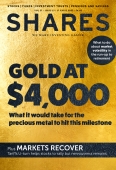Archived article
Please note that tax, investment, pension and ISA rules can change and the information and any views contained in this article may now be inaccurate.
After discovery bright spot for BP what next for UK energy giants?

Together, BP (BP.) and Shell (SHEL) accounted for more than 10% of the FTSE 100 index at the end of the first quarter, meaning their fortunes matter to anyone with exposure to the UK market through a tracker fund.
Both firms are finding life difficult thanks to slumping commodity prices, although BP gave investors a rare bit of good news on 14 April as it unveiled a major oil discovery at its Far South prospect in the Gulf of Mexico.
This provides something of a fillip after a poorly-received strategic refresh, with the company abandoning a long-derided green push, but is unlikely to prove enough in isolation to convince sceptics it is on the right course.
Chair Helge Lund has fallen on his sword but chief executive Murray Auchincloss remains very much in the spotlight with activist investor Elliott remaining on the shareholder register and pushing for more radical changes than were outlined at BP’s crunch investor day at the end of February.
The company has subsequently guided for a ‘weak’ first-quarter gas marketing and trading result and warned of an uptick in net debt, heaping further pressure on management.
Ahead of its results for the first three months of the year in full on 29 April, BP said debt at the end of the first quarter was expected to be ‘around $4 billion’ higher compared to the fourth quarter.
Given the company’s elevated level of borrowings compared with its peers is one of the key sticking points for investors, this uptick in net debt is not helpful. There remains a sense that more radical action is required at BP to quieten Elliott and really get the market on side.
Shell is clearly not immune to wider macro factors and unveiled its own relatively disappointing first-quarter teaser ahead of the detailed numbers on 2 May, cutting guidance for LNG (liquefied natural gas) volumes and gas production thanks to weather-related outages in Australia.
However, chief executive Wael Sawan is at least able to point to a much better showing than its UK-listed rival – reflected in the share price performance shown in the chart.
Shell’s move into natural gas over the last decade or more has paid off and it had already gone further in walking back its commitments to the energy transition, which were never as far-reaching as BP’s in the first place.
Ultimately both firms will, to varying degrees, be at the mercy of future movements in oil prices. As consultancy outfit Capital Economics observes: ‘While the final shape of trade policy remains uncertain, demand shocks in the world’s two largest oil consumers [US and China] will be another negative for already soft oil demand.’
Important information:
These articles are provided by Shares magazine which is published by AJ Bell Media, a part of AJ Bell. Shares is not written by AJ Bell.
Shares is provided for your general information and use and is not a personal recommendation to invest. It is not intended to be relied upon by you in making or not making any investment decisions. The investments referred to in these articles will not be suitable for all investors. If in doubt please seek appropriate independent financial advice.
Investors acting on the information in these articles do so at their own risk and AJ Bell Media and its staff do not accept liability for losses suffered by investors as a result of their investment decisions.
Issue contents
Editor's View
Feature
Great Ideas
News
- Housing services provider Mears hits five-year high on ’beat-and-raise’
- Weak US market and operational difficulties sink TT Electronics stock
- Tesco shares drop on fears it will launch ‘price war’ to raise market share
- Can Relx maintain its strong performance in the first quarter?
- Is this the end of the road for Tesla bulls?
- After discovery bright spot for BP what next for UK energy giants?
- Markets recover some poise after tariff U-turn
 magazine
magazine








